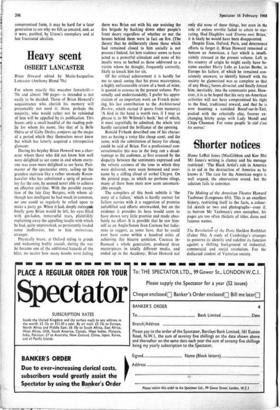Heavy scent
OSBERT LANCASTER
Brian Howard edited by Marie-Jacqueline Lancaster (Anthony Blond 70s) For whom exactly this macabre festschrift- 70s and almost 700 pages—is intended is not easily to be decided. Those of Brian Howard's acquaintance who cherish his memory will presumably not need it; those, perhaps the majority, who would rather not be reminded of him will be appalled by its publication. This leaves only a small handful of the reading pub- lic for whom his name, like that of la Belle Otero or of Gaby Deslys, conjures up the magic of a period which they themselves never knew but which has latterly acquired a retrospective glamour.
During his heyday Brian Howard was a char- acter whom those who did not know him well were delighted to see come in and whom every- one was even more delighted to see leave. Past- master of the spectacular entry, sailing up the grandest staircase like a rather unsteady Rosen- kavalier who has substituted a sprig of poison- ivy for the rose, he seemed never able to achieve an effective exit-line. With the possible excep- tion of the late Guy Burgess, with whom al- though less intelligent he had much in common, no one could so regularly be relied upon to make a party go. When it had, deeply outraged; finally gone Brian would be left, his eyes filled with gin-laden, remorseful tears, plaintiVely explaining away the appalling insults with which he had, quite unprovoked, so persistently loaded some inoffensive, but to him monstrous, stranger.
Physically brave, at Oxford riding in grinds and welcoming bodily assault, during the war he became one of the additional hazards of the blitz; no matter how many bombs were falling there was Brian out with his axe assisting the fire brigade by hacking down other people's front doors regardless of whether or not the houses behind them were in fact on fire. (The theory that he deliberately chose those which had remained closed to him socially is not proven.) Indeed, for him violence seems to have acted as a powerful stimulant and none of his insults were so barbed as those addressed to a victim whom he thought, frequently correctly, likely to knock him for six.
Of his critical achievement it is hardly for me to speak seeing that his prose masterpiece, a highly unfavourable review of a book of mine, is quoted in extenso in the present volume. Per- sonally and understandably, I prefer his appre- ciation of an important work on French paint- ing, his last contribution to the Architectural Review, which started (I quote from memory), 'A bird in the hand is worth two, if I may so phrase it, in Mr Wilenski's bush,' but of which, it must regretfully be admitted, the whole text hardly sustained the brilliance of the opening.
Ronald Firbank described one of his charac- ters as having a voice like cheap scent, and the same, with the substitution of heavy for cheap, could be said of Brian. For a professional con- versationalist this was in the long run a disad- vantage as the audience, at first aroused by the disparity between the sentiments expressed and the velvety cosiness of the tone in which they were delivered, were soon bemused and over- come by a stifling cloud of verbal Chypre. On the printed page, to which no perfume clings, many of these bons mots now seem unremark- able enough.
The compilers of this book subtitle it 'the story of a failure,' which is hardly correct for failure carries with it a suggestion of promise unfulfilled and efforts unrewarded, but on the evidence it provides its hero would seem to have shown very little promise and made abso- lutely no effort. It is possible that he saw him- self as an Anglo-Saxon Jean Cocteau but ludic- rous to suggest, as some have, that he could ever have come within a hundred miles of achieving this bizarre ambition. Cocteau in- fluenced a whole generation, produced three masterpieces in totally different media, and ended up in the Academy; Brian Howard not only did none of these things, but even in the role of enfant terrible failed to attain to star. rating. Had Diaghilev said Etonne moi, Brian,' it is likely he would have been disappointed.
Despite Eton, Oxford, Paris, and determined efforts to forget it, Brian Howard remained at bottom an American, a fact which is insuffi- ciently stressed in the present volume. Left in his country of origin he might easily have be- come another Harry Lehr or Lucius Beebe; in Europe his failure, of which he remained con- sciously unaware, to identify himself with the society he glamorised was as complete as that of any Hen iv James deracine, and finally forced him, inevitably, into the communist pose. How- ever, it is to be hoped that his very un-American activities will not have compromised his right to the final, traditional reward, and that he is now haunting a vanished Boeuf-sur-le-Toit, packed with the celestially chic, forever ex- changing bitchy quips with Lady Mend! and Chips Channon. For some people 'le cid c'est les autres.'


































 Previous page
Previous page